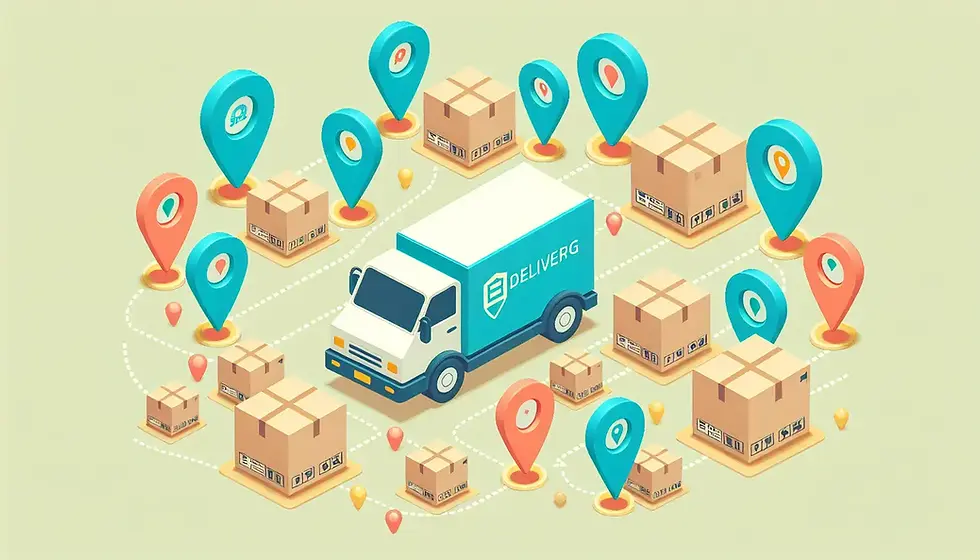The Future of Retail Fulfillment: Adapting to the Evolving E-commerce Landscape
- Nov 3, 2025
- 4 min read
In today's fast-paced digital world, the retail industry is undergoing a significant transformation. With e-commerce growing rapidly, retailers must adapt to the evolving landscape of fulfillment to meet consumer demands and stay competitive. This blog explores the future of retail fulfillment and the strategies retailers are using to thrive in this dynamic environment.

The Impact of Technology on Retail Fulfillment
Technology is at the forefront of changes in retail fulfillment. From robotics in warehouses to AI-powered inventory management, retailers are increasingly relying on advanced technologies to streamline operations and enhance efficiency. In this section, we'll delve into how these technologies are transforming fulfillment processes.
One of the most significant advancements in retail fulfillment is the use of automated warehouses. These facilities utilize sophisticated robots to manage inventory, handle picking and packing tasks, and optimize space utilization, significantly reducing human error and operational costs. The deployment of automation not only speeds up fulfillment times but also enhances the scalability of operations, allowing retailers to handle peak periods with ease. Moreover, AI-driven algorithms are employed to analyze consumer data, predicting demand patterns and adjusting inventory levels in real time, ensuring that popular products are always in stock and that supply chains remain uninterrupted.
Additionally, the integration of Internet of Things (IoT) devices is revolutionizing how retailers monitor and manage their supply chains. For instance, IoT-enabled sensors can track the location and condition of goods throughout transit, providing retailers and customers alike with real-time updates on delivery progress. This not only enhances transparency but also empowers customers with reliable delivery information, thereby improving their overall shopping experience. These innovations underscore the importance of technology in propelling retail fulfillment towards greater efficiency, accuracy, and customer satisfaction.
The Rise of Omnichannel Fulfillment Strategies
With the lines between online and offline retail blurring, omnichannel fulfillment strategies are becoming crucial. Retailers are integrating their physical and digital operations to offer consumers seamless experiences. This section discusses how omnichannel strategies are reshaping the retail landscape.
As customer expectations evolve, businesses are recognizing the need for omnichannel strategies that encompass multiple touchpoints in the purchasing journey. BOPIS, or 'Buy Online, Pick Up In Store,' is a prime example of such a strategy that merges convenience with immediacy. This approach not only saves on shipping costs but also draws customers into physical stores, where they are more likely to make additional purchases. Furthermore, retailers are leveraging platforms that synchronize stock levels across physical and online outlets, allowing them to fulfill orders from the nearest location, thus minimizing delivery times and costs.
Another pivotal element of omnichannel fulfillment is the availability of flexible return policies. By offering options such as in-store returns for online purchases, retailers enhance customer confidence and satisfaction, reducing the barrier to conversion. This seamless integration of channels not only caters to diverse shopping preferences but also ensures a cohesive brand experience across all points of interaction. As retailers continue to refine their omnichannel strategies, they are better positioned to capture and retain customer loyalty in an increasingly competitive market.
Sustainability in Retail Fulfillment
As environmental concerns grow, sustainability in retail fulfillment is gaining attention. Consumers are increasingly demanding eco-friendly practices, pushing retailers to adopt greener solutions. Here, we'll explore how sustainability is influencing fulfillment strategies and consumer choices.
Retailers are under increasing pressure to implement sustainable practices within their supply chains to reduce their environmental footprint. This includes the use of eco-friendly packaging materials that are either recyclable or biodegradable. Many forward-thinking companies have also begun to optimize their logistics networks to further lower carbon emissions by ensuring deliveries are efficient and reducing unnecessary transport routes. This not only aligns with consumer values but also results in cost savings associated with reduced material use and energy consumption.
Another aspect of sustainability in retail fulfillment is the adoption of circular economy principles. This involves designing products for longer lifecycles, encouraging reuse, and facilitating the easy return and recycling of products at the end of their life. By doing so, retailers can create closed-loop systems that significantly minimize waste. As more consumers become aware of the environmental impact of their purchasing decisions, those companies that lead in sustainability practices are likely to gain a competitive edge by appealing to the environmentally conscious shopper.
Enhancing Customer Experience Through Fulfillment
Meeting customer expectations is paramount in today's competitive retail market. Fast and reliable delivery options have become a key differentiator for retailers. This section highlights how retailers are enhancing customer experiences through innovative fulfillment practices.
A key factor in enhancing customer experience is the provision of personalized services, which is made possible by leveraging data analytics. Retailers can use data to tailor delivery options and experiences to individual preferences, be it through scheduled deliveries or delivery to a preferred location. Moreover, real-time tracking visibility empowers customers, providing them with reassurance and reducing the anxiety often associated with awaiting a delivery. Such personalized services not only improve customer satisfaction but also foster loyalty and repeat business.
In addition to personalization, ensuring reliability and speed in delivery is essential. With same-day delivery becoming more widely expected, retailers must streamline their logistics and distribution centers to meet these demands. Partnerships with new-age delivery services using innovative fulfillment models like drone deliveries or autonomous vehicles could hold the key to resolving last-mile delivery challenges. These advancements speak to an enhanced customer-centric approach where speed, convenience, and reliability reign supreme in the realm of retail fulfillment.
Embracing Change in Retail Fulfillment
As technology continues to shape the future of retail fulfillment, businesses must remain agile and open to innovation. By embracing automation, prioritizing sustainability, and enhancing customer experiences, retailers can successfully navigate the evolving e-commerce landscape. Those who adapt will not only survive but thrive in this exciting new era of retail.



Comments